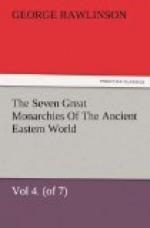In expeditions it sometimes happened that a question arose as to the people or country next to be attacked. In such cases it appears that recourse was had to divination, and the omens which were obtained decided whither the next effort of the invader should be directed. Priests doubtless accompanied the expeditions to superintend the sacrifices and interpret them on such occasions. According to Diodorus, the priests in Babylonia were a caste, devoted to the service of the native deities and the pursuits of philosophy, and held in high honor by the people. It was their business to guard the temples and serve at the altars of the gods, to explain dreams and prodigies, to understand omens, to read the warnings of the stars, and to instruct men how to escape the evils threatened in those various ways, by purifications, incantations, and sacrifices. They possessed a traditional knowledge which had come down from father to son, and which none thought of questioning. The laity looked up to them as the sole possessors of a recondite wisdom of the last importance to humanity.
With these statements of the lively but inaccurate Sicilian those of the Book of Daniel are very fairly, if not entirely, in accordance. A class of “wise men” is described as existing at Babylon, foremost among whom are the Chaldaeans; they have a special “learning,” and (as it would seem) a special “tongue;” their business is to expound dreams and prodigies; they are in high favor with the monarch, and are often consulted by him. This body of “wise men” is subdivided into four classes—“Chaldaeans, magicians, astrologers, and soothsayers”—a subdivision which seems to be based upon difference of occupation. It is not distinctly stated that they are priests; nor does it seem that they were a caste; for Jews are enrolled among their number, and Daniel himself is made chief of the entire body. But they form a very distinct order, and constitute a considerable power in the state; they have direct communication with the monarch, and they are believed to possess, not merely human learning, but a supernatural power of predicting future events. High civil office is enjoyed by some of their number.




